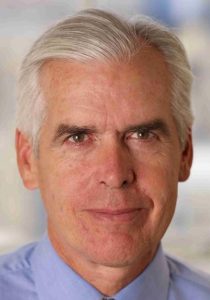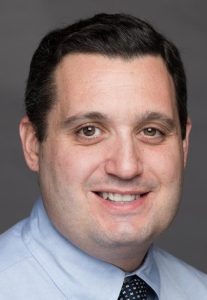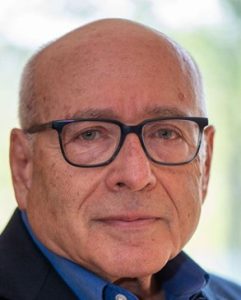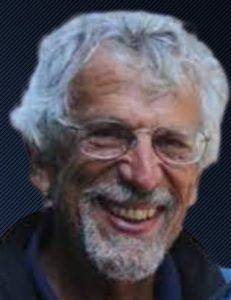EP 926 Red Tape is Choking America’s Can-Do Spirit
 Frustration with government is widespread, but neither party has a vision for making things work sensibly, according to our guest, Philip K. Howard, the chair of Common Good, a nonpartisan organization aimed at simplifying government procedures and practices and the author of his new book, “Saving Can-Do: How to Revive the Spirit of America.” Hidebound rules delay projects and add costs which then keep important supports from government from getting to the people who need them. For years, Howard has described the reforms that are needed to empower people in government to use their good judgment and put aside the rulebook. He has classic examples of well-intended legislation never actually moving from good policy to timely practice and implementation, particularly in the sphere of infrastructure enhancements. In many ways, we are living off the good public works of our great grandfathers. And shouldn’t the reams of paperwork in health care be shredded to afford doctors more time to focus on patient care? DOGE wasn’t the answer, he says. Nor is the Democrat response to protect the status quo. He offers a way forward in his book and on this podcast.
Frustration with government is widespread, but neither party has a vision for making things work sensibly, according to our guest, Philip K. Howard, the chair of Common Good, a nonpartisan organization aimed at simplifying government procedures and practices and the author of his new book, “Saving Can-Do: How to Revive the Spirit of America.” Hidebound rules delay projects and add costs which then keep important supports from government from getting to the people who need them. For years, Howard has described the reforms that are needed to empower people in government to use their good judgment and put aside the rulebook. He has classic examples of well-intended legislation never actually moving from good policy to timely practice and implementation, particularly in the sphere of infrastructure enhancements. In many ways, we are living off the good public works of our great grandfathers. And shouldn’t the reams of paperwork in health care be shredded to afford doctors more time to focus on patient care? DOGE wasn’t the answer, he says. Nor is the Democrat response to protect the status quo. He offers a way forward in his book and on this podcast.
Podcast: Play in new window | Download
 Rare earth minerals may be a misnomer. While they are critical minerals to our modern, digital life, they are not that rare. The problem is finding them in concentrated places where it is economically and environmentally responsible to mine them. This group of 17 metallic elements is crucial for modern technologies due to their magnetic and electrical properties. They can be found in products as diverse as F-35 fighter jets, iPhones, wind turbines, televisions and night-vision goggles. While there are various ways of extracting them, mining is the primary method, though repurposing them from older digital devices is another approach. With all that said, their value to modern economies cannot be overstated. And given China’s stranglehold on the global market and the fact that America only has one functioning mine to date, has been a point of great friction in relations between the two nations. We explore all of these topics on today’s podcast with Ernest Scheyder, the author of “The War Below: Lithium, Copper and the Global Battle to Power Our Lives.”
Rare earth minerals may be a misnomer. While they are critical minerals to our modern, digital life, they are not that rare. The problem is finding them in concentrated places where it is economically and environmentally responsible to mine them. This group of 17 metallic elements is crucial for modern technologies due to their magnetic and electrical properties. They can be found in products as diverse as F-35 fighter jets, iPhones, wind turbines, televisions and night-vision goggles. While there are various ways of extracting them, mining is the primary method, though repurposing them from older digital devices is another approach. With all that said, their value to modern economies cannot be overstated. And given China’s stranglehold on the global market and the fact that America only has one functioning mine to date, has been a point of great friction in relations between the two nations. We explore all of these topics on today’s podcast with Ernest Scheyder, the author of “The War Below: Lithium, Copper and the Global Battle to Power Our Lives.” I’m old enough to remember when ABC, NBC and CBS dominated our television viewing and our consumption of electronic news, and that the viewer had to be in front of the television set at an appointed time to receive the information. Today, the gatekeeper, who once decided when and what type of news content you would see or hear, is a relic. News on your phone, social media, podcasts and all manner of sources put you in control of what you will read, see and hear. Newspapers, television and radio have become almost quaint and rarely utilized by anyone under a certain age. If you want to get lost in a fever swamp of biased coverage, it’s yours to consume. This portends that attracting large audiences will continue to become more difficult over time and, thus, the business model to maintain, say, CNN, will become more difficult, too. You will have to be a sophisticated consumer of information to determine the value of these new sources as old, traditional brands continue to eviscerate, replaced by, well, who really knows. In addition to these changes, the headwinds from the Trump Administration and its longstanding vendetta against ‘fake news’ continues unabated. These are changing times. To discuss it all with us is Ben Bogardus, Professor of Journalism and Chair of the Department at Quinnipiac University in Connecticut.
I’m old enough to remember when ABC, NBC and CBS dominated our television viewing and our consumption of electronic news, and that the viewer had to be in front of the television set at an appointed time to receive the information. Today, the gatekeeper, who once decided when and what type of news content you would see or hear, is a relic. News on your phone, social media, podcasts and all manner of sources put you in control of what you will read, see and hear. Newspapers, television and radio have become almost quaint and rarely utilized by anyone under a certain age. If you want to get lost in a fever swamp of biased coverage, it’s yours to consume. This portends that attracting large audiences will continue to become more difficult over time and, thus, the business model to maintain, say, CNN, will become more difficult, too. You will have to be a sophisticated consumer of information to determine the value of these new sources as old, traditional brands continue to eviscerate, replaced by, well, who really knows. In addition to these changes, the headwinds from the Trump Administration and its longstanding vendetta against ‘fake news’ continues unabated. These are changing times. To discuss it all with us is Ben Bogardus, Professor of Journalism and Chair of the Department at Quinnipiac University in Connecticut. Where did “The Little House on the Prairie” go? It’s probably in foreclosure and will be sold to a private equity company to build nondescript condominiums. In its place has grown up a powerful factory farming industry which has no particular affinity for the welfare of the farm animals they sell, the workers they often import or the environment they are wreaking havoc with. Our guest, author Will Potter, spent ten years researching the subject and he documents in his powerful book “Little Red Barns: Hiding the Truth from Farm to Fable,” a secret world of disinformation, corporate corruption and social control. Big Ag has made it difficult for us to see how the animals whose products we consume are treated, despite efforts by animal activists to show us the horrible conditions. Perhaps we don’t want to see and know why food is plentiful and by some standards more affordable in this modern era. If you’re one of the people who wants to know about the cultural shift in how we come about the food supply that makes its way into our homes, take a listen.
Where did “The Little House on the Prairie” go? It’s probably in foreclosure and will be sold to a private equity company to build nondescript condominiums. In its place has grown up a powerful factory farming industry which has no particular affinity for the welfare of the farm animals they sell, the workers they often import or the environment they are wreaking havoc with. Our guest, author Will Potter, spent ten years researching the subject and he documents in his powerful book “Little Red Barns: Hiding the Truth from Farm to Fable,” a secret world of disinformation, corporate corruption and social control. Big Ag has made it difficult for us to see how the animals whose products we consume are treated, despite efforts by animal activists to show us the horrible conditions. Perhaps we don’t want to see and know why food is plentiful and by some standards more affordable in this modern era. If you’re one of the people who wants to know about the cultural shift in how we come about the food supply that makes its way into our homes, take a listen. How has the MAGA movement in Trump 2.0 been so resolute in meeting its objectives, as stated in Project 2025, despite the President’s own disavowal of the document? The ideas of the unitary executive, the politization of the federal bureaucracy and the dismantlement of federal programs, such as USAID, has been so stark in contrast to Donald Trump’s first term. In her new book, “The Furious Right: The Making of the MAGA Right,” political theorist, Laura K. Field, describes the movement as a clustered and networked assemblage of three distinct but overlapping camps: The Claremonters, the Postliberals, and the National Conservatives. Whereas the old GOP establishment stood for free trade, social conservatism, and internationalism (rooted in anticommunism), today’s New Right stands for nationalist economics, social conservatism, isolationism, and anti-immigration. Can this coalition hand together and achieve its objectives? That’s the discussion we will have with the author today.
How has the MAGA movement in Trump 2.0 been so resolute in meeting its objectives, as stated in Project 2025, despite the President’s own disavowal of the document? The ideas of the unitary executive, the politization of the federal bureaucracy and the dismantlement of federal programs, such as USAID, has been so stark in contrast to Donald Trump’s first term. In her new book, “The Furious Right: The Making of the MAGA Right,” political theorist, Laura K. Field, describes the movement as a clustered and networked assemblage of three distinct but overlapping camps: The Claremonters, the Postliberals, and the National Conservatives. Whereas the old GOP establishment stood for free trade, social conservatism, and internationalism (rooted in anticommunism), today’s New Right stands for nationalist economics, social conservatism, isolationism, and anti-immigration. Can this coalition hand together and achieve its objectives? That’s the discussion we will have with the author today. The success of AI will make some fortunes. Displace others from their professional pursuits. Enhance productivity for corporations. Take strain off of many in the medical field. And more. While we know that the impact of the colliding technologies which enhance deep learning by machines will have a profound impact, in truth we do not yet grasp fully the consequences of its adaption. How could we? While the technologies in play have been with us for years now, the data necessary to drive the enterprise how now amassed to a point where the text and images available can be captured by machines and used to do a host of functions. And until ChatGPT came along most of us were oblivious to this thing called AI. How will society and policymakers adapt to its yet undetermined effects? Will they get into the game early on or wait to see both the positive and ill effects, and by then, will it be too late. We pose all these questions and more with AI researcher, David Eliot, the author of “Artificially Intelligent: The Very Human Story of AI.” His explanations are as crystal clear as his logic and you do not have to understand the technology to appreciate what he has to say.
The success of AI will make some fortunes. Displace others from their professional pursuits. Enhance productivity for corporations. Take strain off of many in the medical field. And more. While we know that the impact of the colliding technologies which enhance deep learning by machines will have a profound impact, in truth we do not yet grasp fully the consequences of its adaption. How could we? While the technologies in play have been with us for years now, the data necessary to drive the enterprise how now amassed to a point where the text and images available can be captured by machines and used to do a host of functions. And until ChatGPT came along most of us were oblivious to this thing called AI. How will society and policymakers adapt to its yet undetermined effects? Will they get into the game early on or wait to see both the positive and ill effects, and by then, will it be too late. We pose all these questions and more with AI researcher, David Eliot, the author of “Artificially Intelligent: The Very Human Story of AI.” His explanations are as crystal clear as his logic and you do not have to understand the technology to appreciate what he has to say. Ira Chaleff, an expert in political followership reveals how political followers can make or ‘brake’ toxic leaders and what we can do-no matter our political sophistication or where we sit on the political spectrum-to support beneficial leaders and stop the rise of prototyrants who are on the verge of becoming…In his new book, “To Stop a Tyrant,” Mr. Chaleff describes the choices for action available to us depending on our circle of influence. He identifies the opportunities available for interrupting a progression from democratic governance to tyrannical rule. He admonishes that early resistance is a key and reminds us of the fact that followers, ‘we the people’, can make a tangible difference in preventing the rise and consolidation of power of toxic political leaders.
Ira Chaleff, an expert in political followership reveals how political followers can make or ‘brake’ toxic leaders and what we can do-no matter our political sophistication or where we sit on the political spectrum-to support beneficial leaders and stop the rise of prototyrants who are on the verge of becoming…In his new book, “To Stop a Tyrant,” Mr. Chaleff describes the choices for action available to us depending on our circle of influence. He identifies the opportunities available for interrupting a progression from democratic governance to tyrannical rule. He admonishes that early resistance is a key and reminds us of the fact that followers, ‘we the people’, can make a tangible difference in preventing the rise and consolidation of power of toxic political leaders. Brody Mullins, and his brother, Luke, wrote the much heralded “The Wolves of K Street”, about how the last fifty years of corporate influence in Washington had shifted Washington D.C.’s center of power from elected officials to extravagantly paid operators, using a new bag of tricks, who bent public policy in favor of corporate interests. That book came out in 2024. And already, according to Brody, the game is changing again. Starting in 2016, corporate PAC money has been declining as a share of campaign finance dollars in favor of Super PAC money. At the same time Trump’s law, in politics, speeding up the process of change in that realm has echoes of Moore’s law in defining the pace of technological change. The pace of what’s happening in Washington D.C. can be dizzying and the way it all lands uncertain. In this podcast, we do our best to walk you through the fast -changing landscape, explain the terms of campaign finance and its implications for our politics.
Brody Mullins, and his brother, Luke, wrote the much heralded “The Wolves of K Street”, about how the last fifty years of corporate influence in Washington had shifted Washington D.C.’s center of power from elected officials to extravagantly paid operators, using a new bag of tricks, who bent public policy in favor of corporate interests. That book came out in 2024. And already, according to Brody, the game is changing again. Starting in 2016, corporate PAC money has been declining as a share of campaign finance dollars in favor of Super PAC money. At the same time Trump’s law, in politics, speeding up the process of change in that realm has echoes of Moore’s law in defining the pace of technological change. The pace of what’s happening in Washington D.C. can be dizzying and the way it all lands uncertain. In this podcast, we do our best to walk you through the fast -changing landscape, explain the terms of campaign finance and its implications for our politics. The doomsday clock is ticking…and who can we blame if the alarm is sounded and we find out it’s too late for the human species to recover? There’s a certain irony that all of the good things that science and technology have wrought, bring with them byproducts which are the key ingredients of our own demise. For instance, will AI and its growing intelligence determine that we are no longer needed? Whoops, there goes the Anthropocene. Or if the convenience of plastics results in its overuse to the degree that its contaminants, breaking down in our bodies, leads to our demise. Or the ability to harness the atom and the development of the atomic bomb results in a madman turning the switch and the conflagration we’ve all feared arrives. To discuss these weighty issues, and major concerns, is Dr. Peter Solomon–a scientist, educator, entrepreneur, and author. In his latest book, a novel, “100 Years to Extinction”, he looks at these and other ‘achievements of science’ to determine if astrophysicist Stephen Hawking’s dire prediction of human extinction by 2117 may be right.
The doomsday clock is ticking…and who can we blame if the alarm is sounded and we find out it’s too late for the human species to recover? There’s a certain irony that all of the good things that science and technology have wrought, bring with them byproducts which are the key ingredients of our own demise. For instance, will AI and its growing intelligence determine that we are no longer needed? Whoops, there goes the Anthropocene. Or if the convenience of plastics results in its overuse to the degree that its contaminants, breaking down in our bodies, leads to our demise. Or the ability to harness the atom and the development of the atomic bomb results in a madman turning the switch and the conflagration we’ve all feared arrives. To discuss these weighty issues, and major concerns, is Dr. Peter Solomon–a scientist, educator, entrepreneur, and author. In his latest book, a novel, “100 Years to Extinction”, he looks at these and other ‘achievements of science’ to determine if astrophysicist Stephen Hawking’s dire prediction of human extinction by 2117 may be right. And you think your family has some great achievements and enough demerits to warrant a book? Well, clearly, author and New Yorker writer, John Seabrook’s family, has all of that in triplicate and he spells it all out in the eminently readable “The Spinach King: The Rise and Fall of an American Dynasty.” His grandfather, C.F. Seabrook, hailed as the “Henry Ford of Agriculture,” built an empire in the bean fields of southern New Jersey. Seabrook Farms, which at its peak in the mid-1950’s grew a third of America’s frozen vegetables–and made his family wealthy, glamorous and powerful. They literally drove the transition from horsepower to mechanized agriculture and pioneered quick-frozen food, which changed the nation’s eating habits. However, there’s much more to this story which a grandson, John, captures in the book and on the podcast which might not put such a positive spotlight on his family. Thanks to a box handed down to him by his father, he was able to recount the good and the bad and give us a remarkable picture of American innovation, wealth and some of the not so genteel ways fortunes are made.
And you think your family has some great achievements and enough demerits to warrant a book? Well, clearly, author and New Yorker writer, John Seabrook’s family, has all of that in triplicate and he spells it all out in the eminently readable “The Spinach King: The Rise and Fall of an American Dynasty.” His grandfather, C.F. Seabrook, hailed as the “Henry Ford of Agriculture,” built an empire in the bean fields of southern New Jersey. Seabrook Farms, which at its peak in the mid-1950’s grew a third of America’s frozen vegetables–and made his family wealthy, glamorous and powerful. They literally drove the transition from horsepower to mechanized agriculture and pioneered quick-frozen food, which changed the nation’s eating habits. However, there’s much more to this story which a grandson, John, captures in the book and on the podcast which might not put such a positive spotlight on his family. Thanks to a box handed down to him by his father, he was able to recount the good and the bad and give us a remarkable picture of American innovation, wealth and some of the not so genteel ways fortunes are made.